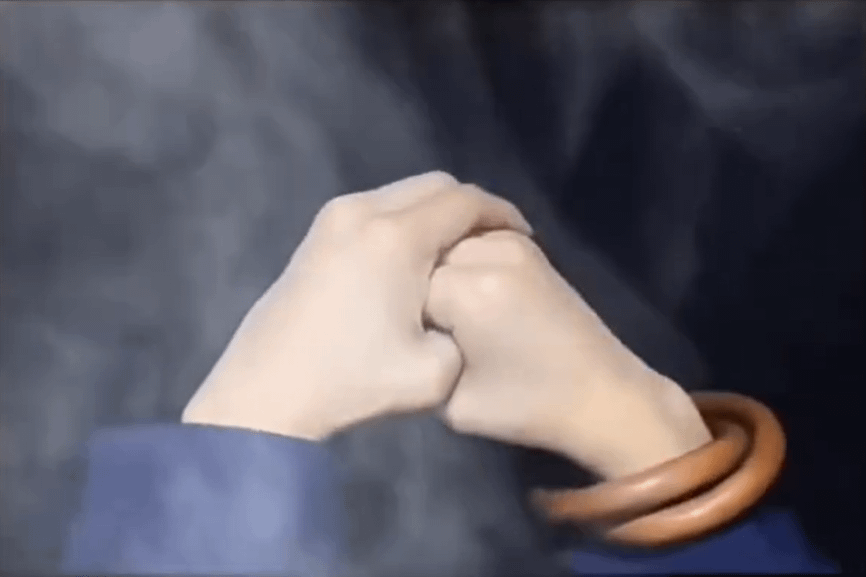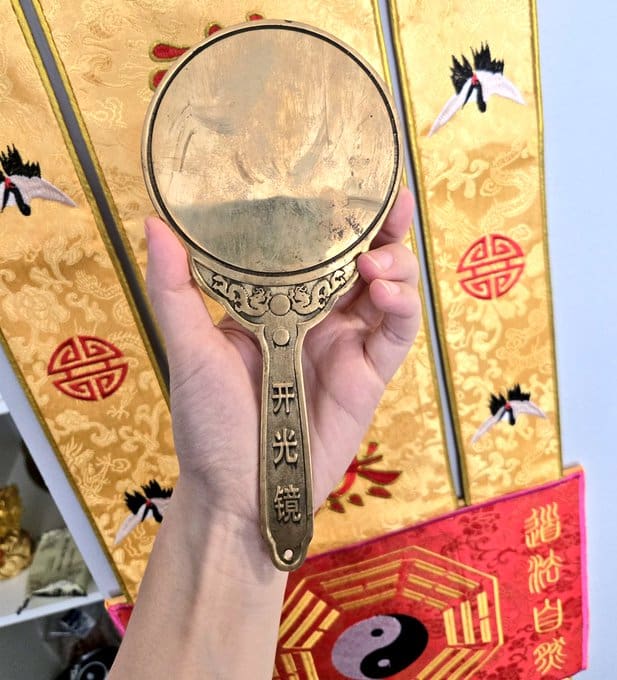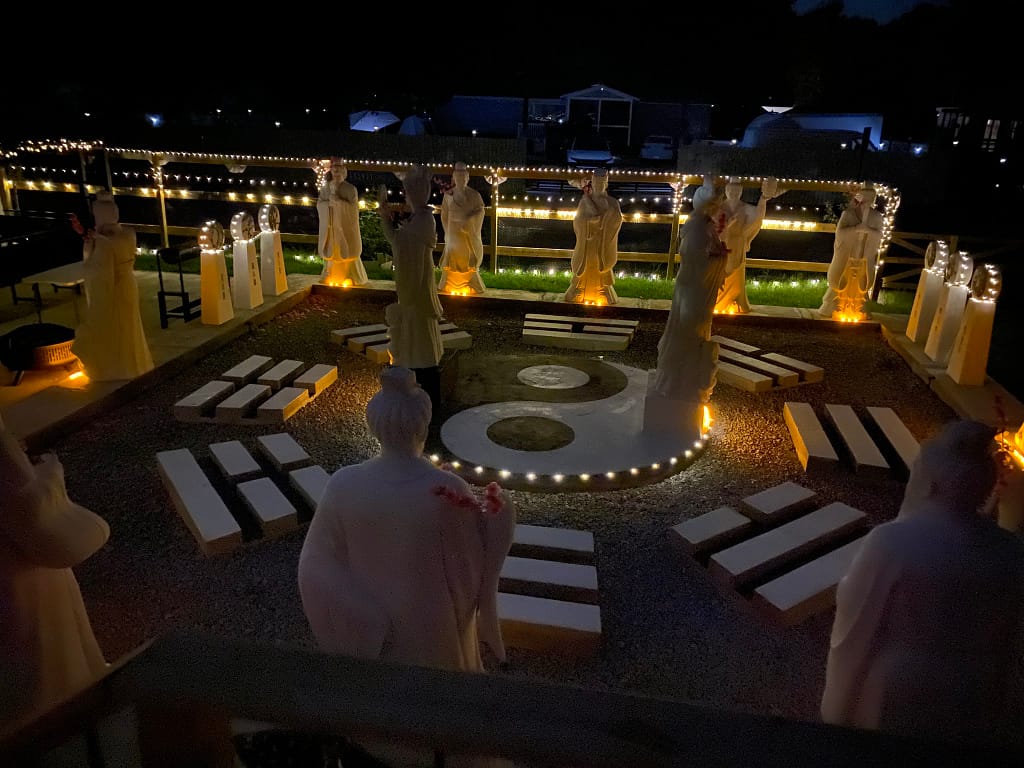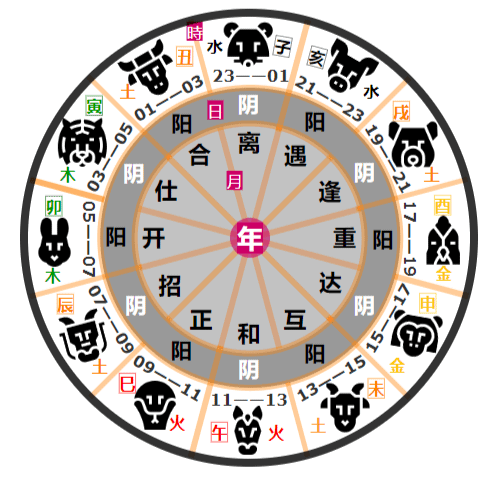Learner
Taoist etiquette learning
In ancient rituals, men and women were different. Men embraced the right hand with their left hand, while women embraced the left hand with their right hand (the difference between men and women is yin and yang). Taoism respects the left hand, so both men and women embrace the right hand with their left hand. When bowing, the left hand is outside, showing the left hand to others, which shows sincerity and respect.
The ritual of entering the temple
Incense burning etiquette
Kneeling

Taoist instruments
Taoist objects of worship come from primitive religions and early ritual music activities of worshiping heaven and ancestors. As early as the Liu Song Dynasty of the Northern and Southern Dynasties, Lu Xiujing had made strict regulations on Taoist objects of worship. In the "Regulations on the Rites of the Sacred" in Volume 4 of "Daozang Tianhuang Zhidao Taiqing Yuce", there are detailed records on the standardized production of Taoist objects such as "sacred throne", "dragon tablet", "turtle and crane furnace", "banner" and "cover".
Taoist Dharma Seal
Brass mirror
Peach wood sword

Taoist gods
The gods of Xuanmen Taoism include: the main gods: the creator goddess Xuannv, the protector goddess Su Nu, the ruler god Laozi, the savior god Yuanshi. The ten righteous gods: Yubao Huangshang, Xuanzhen Wanfu, Taimiao Zhiji, Xuanshang Yuchen, Duxian Shangsheng, Haosheng Duming, Tailing Xuhuang, Wuliang Taihua, Yuxu Minghuang, Zhenhuang Dongshen.
The Goddess of Creation
The Guardian Goddess Su Nu
Laozi, the God of Rule

Chapter 1 of the Daodejing
The Tao that can be spoken is not the eternal Tao. The name that can be named is not the eternal name. The nameless is the origin of heaven and earth; The named is the mother of ten thousand things. Thus, ever without desire, one beholds its mystery; Ever with desire, one sees only its manifestations. These two emerge together but differ in name. Their unity is called the profound. Profound and yet more profound, It is the gate to all wonders.
Chapter 1: Xiaoyao You
In the Northern Darkness, there is a fish named Kun. The Kun is so vast that its size stretches thousands of miles. It transforms into a bird named Peng, whose back spans thousands of miles. When it rises and flies, its wings are like clouds hanging from the sky. This bird, when the seas stir, migrates to the Southern Darkness. The Southern Darkness is the Pool of Heaven. The Records of Qi say: “When the Peng journeys to the Southern Darkness, the waters are roiled for three thousand miles, and it soars upward on a whirlwind, rising ninety thousand miles, sustained by the wind for six months before it rests.” Heat waves shimmer, dust and chaff float in the air, and creatures are blown about by the wind. Is the sky’s azure truly its color, or merely the vast distance of its limitlessness? When the Peng looks down from above, this is what it sees. [Summary of following sections]: The text contrasts the Peng’s vastness with smaller creatures like the cicada and dove, who laugh at the Peng’s need for such a grand journey, illustrating the relativity of perspective. A small bird cannot fathom the scale of the Peng, just as humans cling to limited views. Zhuangzi then discusses the limitations of human ambition (e.g., the official seeking fame) versus the “perfect man” who rides the winds, free from worldly attachments. The chapter critiques rigid distinctions of big/small, useful/useless, using stories like the useless tree that survives because it is not cut down.
Chapter 1: Shanggu Tianzhen Lun
In ancient times, the Yellow Emperor was born with divine spirit, spoke in youth, was perceptive in childhood, sincere and bright in maturity, and ascended to heaven in adulthood. He asked his teacher Qibo: “I have heard that people in antiquity lived beyond a hundred years, their movements undiminished. Yet today, people at fifty are weakened in action. Is this due to changes in the times, or have people lost the way?” Qibo replied: “The ancients who understood the Tao followed the principles of yin and yang, harmonized with the arts of divination, ate and drank in moderation, kept regular hours of rest and activity, and avoided reckless exertion. Thus, their body and spirit were united, allowing them to fulfill their natural lifespan, living beyond a hundred years before passing.” [Summary of following sections]: Qibo explains that ancient sages aligned with cosmic rhythms, maintained balance in diet and emotions, and cultivated qi through moderation. Modern people, however, indulge in excess (e.g., overeating, overworking, emotional extremes), disrupting yin-yang harmony and causing premature aging. The chapter details how men and women’s health declines at specific ages (e.g., 8-year cycles for men, 7-year cycles for women) due to weakening qi and essence (jing). It emphasizes preventive practices like regulating desires, nurturing essence, and aligning with seasonal changes to maintain vitality.
